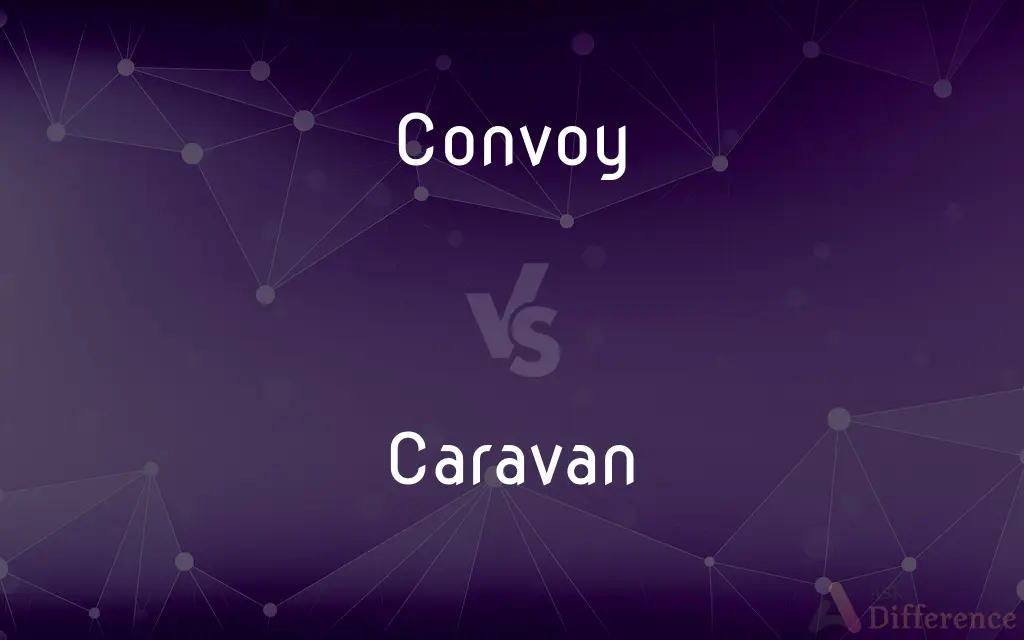Convoy vs. Caravan — What's the Difference?
By Tayyaba Rehman & Urooj Arif — Updated on April 22, 2024
A convoy is a group of vehicles, typically ships or trucks, traveling together for mutual support and protection; a caravan refers to a group of people, often with animals or vehicles, traveling together across difficult terrain.

Difference Between Convoy and Caravan
Table of Contents
ADVERTISEMENT
Key Differences
A convoy usually consists of vehicles, such as ships or military trucks, traveling together for protective reasons. This formation is often used in military contexts or for transporting valuable or sensitive cargo, where the risk of attack or theft is mitigated by the presence of armed escorts or other defensive measures. While, a caravan is traditionally a group of people traveling together, often through harsh or challenging environments like deserts. Caravans are historically associated with trade routes, where merchants would travel in groups for safety against bandits and to help each other navigate difficult conditions.
The term "convoy" implies a structured and organized approach to travel, with a focus on security and efficiency. Routes and schedules are typically well-planned to ensure safety and timely arrival, emphasizing coordination among the participants. Whereas, "caravan" suggests a more communal travel experience, often for economic, social, or cultural reasons, with the journey itself holding significant importance and often involving stops for rest and interaction among travelers.
Convoys are generally managed or organized by a central authority, such as a government, military, or commercial entity, ensuring that all vehicles adhere to the same protocols and standards. On the other hand, caravans, especially historical ones, were organized by the traders themselves or by communities, with leadership roles sometimes shifting during the journey.
In modern contexts, convoys often relate to specific operations or missions, such as humanitarian aid deliveries in conflict zones or naval groups patrolling strategic waterways. Conversely, caravans, though less common today in their traditional form, are still used metaphorically to describe groups traveling together with a common purpose, such as migrant caravans or motorhome groups exploring scenic routes.
While both convoys and caravans provide safety in numbers, the formality and purpose of convoys are typically mandated by specific operational needs, contrasted with the more organic, community-oriented nature of caravans, which often form out of necessity or cultural tradition.
ADVERTISEMENT
Comparison Chart
Definition
A group of vehicles traveling together for protection and logistical coordination.
A group of people, often with vehicles or animals, traveling together across difficult terrain.
Common Uses
Military operations, secure transport of goods.
Trade routes, cultural or migratory travel.
Organization
Highly structured and controlled by a central authority.
Less formal, often community or group organized.
Primary Focus
Security and efficiency in reaching the destination.
Safety in numbers and mutual support during the journey.
Modern Examples
Naval convoys, humanitarian aid convoys.
Migrant caravans, recreational vehicle groups.
Compare with Definitions
Convoy
Used primarily for military or protective purposes.
The naval convoy patrolled the strategic sea lane.
Caravan
Symbolic of adventurous and communal travel.
The artist joined a caravan to explore remote parts of the continent.
Convoy
Focuses on efficient and secure delivery of cargo or personnel.
The convoy reached its destination without any incidents.
Caravan
Traditionally used for trade and cultural exchanges.
The Silk Road was famous for its bustling caravans.
Convoy
A group of vehicles traveling together for mutual protection.
The convoy of supply trucks was guarded by two armored vehicles.
Caravan
Can refer to modern recreational travel in groups.
The caravan of RVs stopped at several national parks along their route.
Convoy
Often involves coordination with security forces.
The convoy coordinated its timing with aerial surveillance for safety.
Caravan
Organized around the principles of mutual aid and cooperation.
Members of the caravan shared food and water during their journey.
Convoy
Organized with strict protocols and routes.
The aid convoy followed a carefully planned route to avoid conflict zones.
Caravan
A group of travelers, often moving through harsh environments.
The caravan crossed the desert using camels and horses.
Convoy
A convoy is a group of vehicles, typically motor vehicles or ships, traveling together for mutual support and protection. Often, a convoy is organized with armed defensive support.
Caravan
A company of travelers journeying together, as across a desert or through hostile territory.
Convoy
The act of accompanying or escorting, especially for protective purposes.
Caravan
A single file of vehicles or pack animals.
Convoy
An accompanying and protecting force, as of ships or troops.
Caravan
A large covered vehicle; a van.
Convoy
A group, as of ships or motor vehicles, traveling together with a protective escort or for safety or convenience.
Caravan
Chiefly British A trailer or dwelling place on wheels.
Convoy
To accompany, especially for protection; escort
Warships convoying merchant vessels across the Atlantic.
Caravan
A convoy or procession of travellers, their cargo and vehicles, and any pack animals, especially camels crossing a desert.
Convoy
(nautical) One or more merchant ships sailing in company to the same general destination under the protection of naval vessels.
Caravan
A furnished vehicle towed behind a car, etc., and used as a dwelling when stationary.
Convoy
A group of vehicles travelling together for safety, especially one with an escort.
Caravan
To travel in a caravan (procession).
The wedding party got in their cars and caravaned from the chapel to the reception hall.
Convoy
The act of convoying; protection.
Caravan
To travel and/or live in a caravan (vehicle).
When my parents retired they really got back into caravanning.
Convoy
(transitive) To escort a group of vehicles, and provide protection.
A frigate convoys a merchantman.
Caravan
A company of travelers, pilgrims, or merchants, organized and equipped for a long journey, or marching or traveling together, esp. through deserts and countries infested by robbers or hostile tribes, as in Asia or Africa.
Convoy
(intransitive) To travel under convoy.
Caravan
A large, covered wagon, or a train of such wagons, for conveying wild beasts, etc., for exhibition; an itinerant show, as of wild beasts.
Convoy
To accompany for protection, either by sea or land; to attend for protection; to escort; as, a frigate convoys a merchantman.
I know ye skillful to convoyThe total freight of hope and joy.
Caravan
A covered vehicle for carrying passengers or for moving furniture, etc.; - sometimes shorted into van.
Convoy
The act of attending for defense; the state of being so attended; protection; escort.
To obtain the convoy of a man-of-war.
Caravan
A procession (of wagons or mules or camels) traveling together in single file;
We were part of a caravan of almost a thousand camels
They joined the wagon train for safety
Convoy
A vessel or fleet, or a train or trains of wagons, employed in the transportation of munitions of war, money, subsistence, clothing, etc., and having an armed escort.
Caravan
A camper equipped with living quarters
Convoy
A protection force accompanying ships, etc., on their way from place to place, by sea or land; an escort, for protection or guidance.
When every morn my bosom glowedTo watch the convoy on the road.
Convoy
Conveyance; means of transportation.
Convoy
A drag or brake applied to the wheels of a carriage, to check their velocity in going down a hill.
Convoy
A procession of land vehicles traveling together
Convoy
A collection of merchant ships with an escort of warships
Convoy
The act of escorting while in transit
Convoy
Escort in transit;
The trucks convoyed the cars across the battle zone
The warships convoyed the merchant ships across the Pacific
Common Curiosities
How does a caravan differ from a convoy?
A caravan refers to a group of people traveling together, often in challenging environments, focusing on mutual support rather than strict security protocols.
How are convoys organized?
Convoys are highly organized with predetermined routes, schedules, and often include security measures like armed escorts.
What is the main purpose of a convoy?
The main purpose of a convoy is to provide protection and logistical coordination for a group of vehicles traveling together.
Is there a modern equivalent to caravans?
Modern equivalents to caravans include migrant groups and recreational vehicle enthusiasts traveling together for safety and social interaction.
Can a convoy consist of ships?
Yes, convoys can consist of ships, especially in military or strategic contexts to protect maritime transport.
Why might someone choose to travel in a caravan today?
People may choose to travel in a caravan today for the sense of community, safety in numbers, and to share resources during long travels.
What are the typical conditions caravans face?
Caravans often face harsh environmental conditions, such as deserts or mountainous terrains, requiring cooperation and resource sharing among participants.
What historical significance do caravans hold?
Caravans have historically been crucial for trade and cultural exchanges along routes like the Silk Road.
What are the security measures typical in convoys?
Security measures in convoys can include armed escorts, surveillance, and strategic routing to avoid threats.
How do caravans facilitate trade?
By providing a safe means to transport goods across challenging terrains, caravans historically facilitated trade between distant regions.
How do cultural practices influence caravan travel?
Cultural practices can dictate the rituals, social norms, and organizational structure within a caravan, influencing how people interact and support each other.
What are the logistics involved in planning a convoy?
Planning a convoy involves route mapping, timing coordination, security arrangements, and often liaising with local authorities.
Are convoys used only in wartime?
While commonly used in wartime, convoys are also employed for peacetime activities like humanitarian aid delivery and secure transportation of goods.
Can a caravan be made up of vehicles?
Yes, modern caravans can consist of vehicles, particularly in contexts like cross-country travel in motorhomes.
What risks are associated with traveling in convoys?
Risks include potential attacks, theft, and logistical challenges in maintaining coordination among a large group of vehicles.
Share Your Discovery

Previous Comparison
Meatatarian vs. Carnivore
Next Comparison
Abduct vs. AdductAuthor Spotlight
Written by
Tayyaba RehmanTayyaba Rehman is a distinguished writer, currently serving as a primary contributor to askdifference.com. As a researcher in semantics and etymology, Tayyaba's passion for the complexity of languages and their distinctions has found a perfect home on the platform. Tayyaba delves into the intricacies of language, distinguishing between commonly confused words and phrases, thereby providing clarity for readers worldwide.
Co-written by
Urooj ArifUrooj is a skilled content writer at Ask Difference, known for her exceptional ability to simplify complex topics into engaging and informative content. With a passion for research and a flair for clear, concise writing, she consistently delivers articles that resonate with our diverse audience.














































